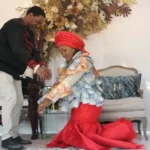HARARE – A storm is brewing within the ranks of Zimbabwe’s ruling party, ZANU-PF, as the announcement of President Emmerson Mnangagwa’s planned retirement at the end of his term ignites a fierce battle for the coveted leadership position. The revelation has sent ripples through the party, with factions coalescing around potential successors, casting a long shadow over Zimbabwe’s political landscape.
Mnangagwa’s decision, confirmed in a recent address to party members, marks the end of an era for ZANU-PF. Having assumed the reins in 2017 following the ousting of long-time leader Robert Mugabe, Mnangagwa’s tenure has been characterised by promises of economic reform and political stability. However, his retirement plans have now opened the floodgates for power struggles within the party, as various factions vie for dominance.
The announcement has sharply divided ZANU-PF into two main camps: those advocating for leadership renewal and those seeking continuity with the old guard.
The faction pushing for renewal argues that fresh leadership is essential to revitalise the party and the country. “We need new blood to tackle the pressing challenges Zimbabwe faces today. It’s time for a generational shift,” said Dr. Pedzisai Ruhanya, a prominent Zimbabwean political analyst. This group is reportedly rallying behind younger leaders who they believe can inject new energy and ideas into the party.
On the other hand, the traditionalists within ZANU-PF argue that maintaining continuity is crucial for the party’s stability and for safeguarding its legacy. “Sticking with the experienced leaders ensures that we don’t lose the progress we’ve made. It’s about stability and preserving the ethos of ZANU-PF,” said Professor Eldred Masunungure, another respected political analyst.
Several high-profile figures have emerged as potential successors, each with their own bases of support and political strategies. Vice President Constantino Chiwenga, a key player in the 2017 coup that brought Mnangagwa to power, is seen as a leading contender. His military background and close ties with the security apparatus make him a formidable candidate.
Meanwhile, Finance Minister Mthuli Ncube has gained traction among reformists within the party. Known for his economic expertise, Ncube is viewed as someone who can continue Mnangagwa’s economic reforms and attract much-needed foreign investment.
Kudakwashe David Mnangagwa, the President’s nephew and Deputy Minister of Finance, also features prominently in succession discussions. His youth and close family ties to the current President provide him with a unique position, though his candidacy is likely to be controversial due to perceptions of nepotism.
The unfolding succession battle has attracted significant attention from political analysts, who offer varying perspectives on the potential outcomes.
“The succession issue is likely to be the most contentious battle ZANU-PF has faced since the Mugabe era. It will test the party’s unity and its ability to manage internal conflicts,” said Dr. Ibbo Mandaza, a veteran political commentator.
Dr. Mandaza also noted the risk of factionalism destabilizing the party, warning that “if not handled carefully, these battles could weaken ZANU-PF’s grip on power and lead to broader political instability in Zimbabwe.”
Professor Masunungure emphasised the importance of a transparent and democratic succession process, suggesting that “ZANU-PF must ensure that the selection of the new leader is inclusive and reflects the will of its members. This will be crucial in maintaining party cohesion and public trust.”
The stakes are high, and the outcome of this power struggle will have a profound impact on Zimbabwe’s future. The party’s ability to manage its internal succession process will determine whether the country can achieve the stability and prosperity its people long for.
As ZANU-PF navigates these turbulent waters, the future of Zimbabwe hangs in the balance. The party’s ability to manage its internal succession process will have far-reaching implications for the country’s political and economic trajectory.
President Mnangagwa’s retirement marks a pivotal moment not just for ZANU-PF, but for the nation. His successor will inherit a host of challenges, from economic woes to calls for political reform and greater democratic freedoms.
In the coming months, all eyes will be on ZANU-PF’s internal machinations and how the party resolves its leadership question. The outcome will shape Zimbabwe’s path forward and determine whether the country can achieve the stability and prosperity its people long for.












